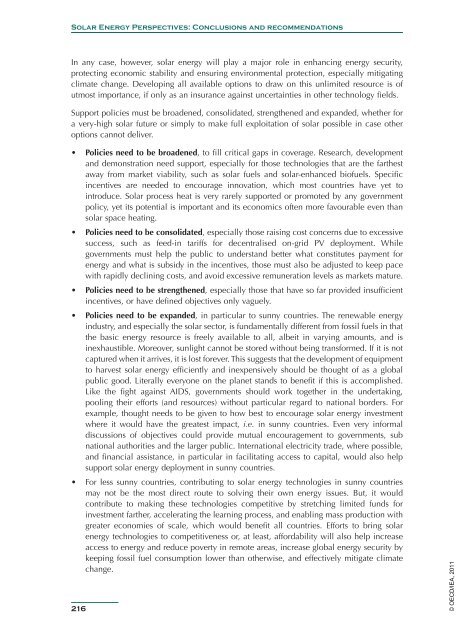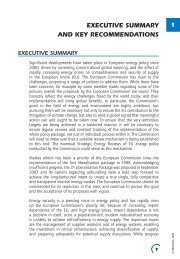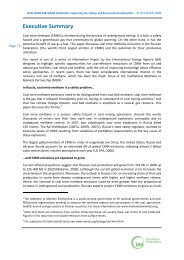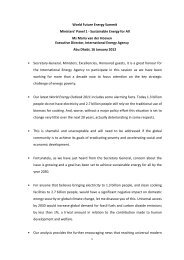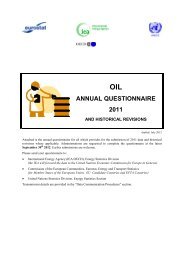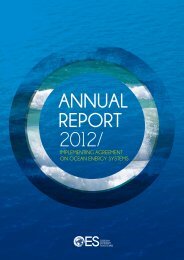Solar Energy Perspectives - IEA
Solar Energy Perspectives - IEA
Solar Energy Perspectives - IEA
Create successful ePaper yourself
Turn your PDF publications into a flip-book with our unique Google optimized e-Paper software.
<strong>Solar</strong> <strong>Energy</strong> <strong>Perspectives</strong>: Conclusions and recommendations<br />
In any case, however, solar energy will play a major role in enhancing energy security,<br />
protecting economic stability and ensuring environmental protection, especially mitigating<br />
climate change. Developing all available options to draw on this unlimited resource is of<br />
utmost importance, if only as an insurance against uncertainties in other technology fields.<br />
Support policies must be broadened, consolidated, strengthened and expanded, whether for<br />
a very-high solar future or simply to make full exploitation of solar possible in case other<br />
options cannot deliver.<br />
• Policies need to be broadened, to fill critical gaps in coverage. Research, development<br />
and demonstration need support, especially for those technologies that are the farthest<br />
away from market viability, such as solar fuels and solar-enhanced biofuels. Specific<br />
incentives are needed to encourage innovation, which most countries have yet to<br />
introduce. <strong>Solar</strong> process heat is very rarely supported or promoted by any government<br />
policy, yet its potential is important and its economics often more favourable even than<br />
solar space heating.<br />
• Policies need to be consolidated, especially those raising cost concerns due to excessive<br />
success, such as feed-in tariffs for decentralised on-grid PV deployment. While<br />
governments must help the public to understand better what constitutes payment for<br />
energy and what is subsidy in the incentives, those must also be adjusted to keep pace<br />
with rapidly declining costs, and avoid excessive remuneration levels as markets mature.<br />
• Policies need to be strengthened, especially those that have so far provided insufficient<br />
incentives, or have defined objectives only vaguely.<br />
• Policies need to be expanded, in particular to sunny countries. The renewable energy<br />
industry, and especially the solar sector, is fundamentally different from fossil fuels in that<br />
the basic energy resource is freely available to all, albeit in varying amounts, and is<br />
inexhaustible. Moreover, sunlight cannot be stored without being transformed. If it is not<br />
captured when it arrives, it is lost forever. This suggests that the development of equipment<br />
to harvest solar energy efficiently and inexpensively should be thought of as a global<br />
public good. Literally everyone on the planet stands to benefit if this is accomplished.<br />
Like the fight against AIDS, governments should work together in the undertaking,<br />
pooling their efforts (and resources) without particular regard to national borders. For<br />
example, thought needs to be given to how best to encourage solar energy investment<br />
where it would have the greatest impact, i.e. in sunny countries. Even very informal<br />
discussions of objectives could provide mutual encouragement to governments, sub<br />
national authorities and the larger public. International electricity trade, where possible,<br />
and financial assistance, in particular in facilitating access to capital, would also help<br />
support solar energy deployment in sunny countries.<br />
• For less sunny countries, contributing to solar energy technologies in sunny countries<br />
may not be the most direct route to solving their own energy issues. But, it would<br />
contribute to making these technologies competitive by stretching limited funds for<br />
investment farther, accelerating the learning process, and enabling mass production with<br />
greater economies of scale, which would benefit all countries. Efforts to bring solar<br />
energy technologies to competitiveness or, at least, affordability will also help increase<br />
access to energy and reduce poverty in remote areas, increase global energy security by<br />
keeping fossil fuel consumption lower than otherwise, and effectively mitigate climate<br />
change.<br />
216<br />
© OECD/<strong>IEA</strong>, 2011


